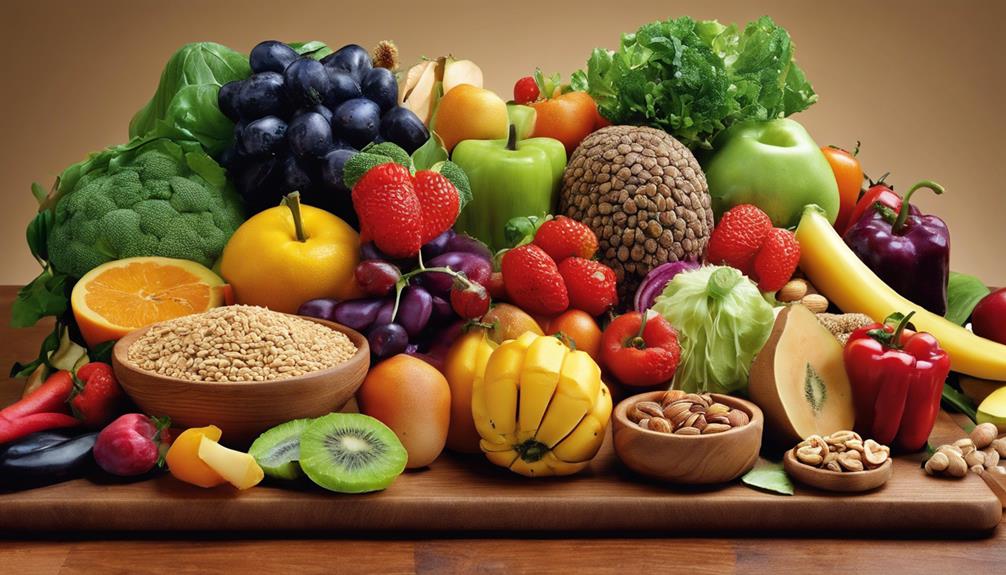As nursing mothers, we grasp the challenges of juggling a busy schedule while focusing on increasing milk supply. While it's tempting to rely solely on supplements, let's explore the power of natural foods in boosting lactation.
By incorporating specific nutrients into our daily diet, we can potentially enhance milk production for our little ones. But what exactly should we be eating to achieve this goal?
Stay tuned as we unravel the secrets behind the essential diet for breastfeeding moms to optimize milk supply.
Key Takeaways
- Prioritize nutrient-rich foods like lean meat, dairy, and beans for optimal milk production.
- Stay hydrated with water and herbal teas like fennel to support breast milk supply.
- Ensure intake of key vitamins and minerals like iron, calcium, and omega-3 fatty acids for lactation.
- Avoid alcohol, caffeine, and certain foods like spicy dishes to maintain a healthy breastfeeding diet.
Nutrient-Rich Foods for Milk Production
To optimize milk production while breastfeeding, incorporating a variety of nutrient-rich foods into our daily diet is essential. Protein-rich foods like lean meat, eggs, dairy, beans, and seafood play an important role in supporting milk production.
Additionally, including whole grains, fruits, and vegetables in our meals can help maintain a balanced milk supply. Opting for nutrient-rich choices such as whole-grain bread with peanut butter or yogurt can further enhance milk production.
It's recommended to consume an extra 330 to 400 calories per day to adequately support breastfeeding and milk production. To make sure we're meeting all nutrient requirements, considering a daily multivitamin and mineral supplement as advised by our healthcare provider is important.
Hydration and Milk Supply

Staying well-hydrated is essential for best milk production in breastfeeding mothers, as breast milk is mostly composed of water. Adequate hydration plays a pivotal role in maintaining milk supply and ensuring the baby receives essential nutrients. To enhance hydration and support milk production, consider incorporating herbal teas such as fennel, fenugreek, or nursing mom tea into your daily routine. These teas not only help with hydration but may also have lactogenic properties that could potentially boost milk supply.
Consistent water intake throughout the day is critical for best milk production, so remember to keep a water bottle handy and drink regularly. Be cautious with caffeine intake, as excessive consumption can lead to dehydration, impacting both your well-being and milk supply. Prioritize staying hydrated with water and nourishing herbal teas to support your breastfeeding journey effectively.
Key Vitamins and Minerals for Lactation
Ensuring adequate intake of key vitamins and minerals is important for supporting lactation and promoting the health of both the mother and the baby during breastfeeding.
Iron is essential for lactating mothers to prevent anemia and maintain overall health.
Calcium plays a vital role in bone health, benefiting both the mother and the growing baby.
Vitamin D is crucial for bone strength and immune function, benefiting both mom and baby.
Omega-3 fatty acids support infant brain development and may help reduce the risk of postpartum depression.
Additionally, magnesium is important for muscle function, nerve function, and energy production, all of which are beneficial for lactating mothers.
By incorporating these essential nutrients into the diet, mothers can support their own well-being, ensure healthy bone development in their infants, boost immune function, aid brain development, and potentially reduce the risk of postpartum depression.
Prioritizing these vitamins and minerals can contribute significantly to the overall health and well-being of both mother and baby during the breastfeeding journey.
Foods to Avoid While Breastfeeding

During breastfeeding, it's important for mothers to be mindful of certain foods to avoid in order to safeguard the health and well-being of their babies. As nursing moms, we need to prioritize our baby's health by being cautious about what we consume. Here are some key foods to steer clear of:
- Alcohol: Avoid alcohol while breastfeeding as it can pass into breast milk and negatively affect the baby's development.
- Caffeine: Limit caffeine intake to 2-3 cups per day to prevent irritability and sleep disturbances in the baby.
- Seafood high in Mercury: Be cautious of seafood high in mercury like shark, swordfish, and king mackerel to safeguard the baby's nervous system.
- Spicy Foods: Steer clear of spicy foods that may cause digestive issues and discomfort for the baby.
Meal Planning Tips for Nursing Moms
To optimize nutrition and support milk supply, nursing moms should incorporate a variety of nutrient-dense foods like whole grains, lean proteins, fruits, and vegetables into their meal planning. Meal prep plays a vital role in ensuring convenient access to healthy snacks and meals throughout the day. Snacking on nuts, seeds, yogurt, and fruits not only helps maintain energy levels but also supports milk supply. Involving family members in meal preparation can reduce stress and guarantee balanced meals. Utilizing slow cookers or instant pots can provide quick and nutritious meal options that require minimal effort. Here is a table illustrating meal planning tips for nursing moms:
| Tips for Meal Planning | Description |
|---|---|
| Include Nutrient-Dense Foods | Opt for whole grains, lean proteins, fruits, and vegetables for balanced meals. |
| Engage in Meal Prep | Plan and prepare meals in advance for easy access to healthy options. |
| Healthy Snacking | Snack on nuts, seeds, yogurt, and fruits to maintain energy levels. |
| Family Involvement | Get family members involved in meal preparation for support and balanced meals. |
Frequently Asked Questions
What Foods to Eat While Breastfeeding to Increase Milk Supply?
We eat foods like oats, almonds, and protein-rich options such as chicken and turkey to boost milk supply while breastfeeding. Whole grains like wheat and nutrient-dense fruits and vegetables help increase milk production. Staying hydrated is essential.
What Is the Diet Plan for Breastfeeding Mothers to Increase Breast Milk?
We prioritize nutrient-dense foods like whole grains, lean proteins, fruits, and veggies for best milk supply. Including galactagogues such as oats, nuts, and fenugreek is beneficial. Hydration with at least 8 cups of fluids daily is essential.
How Can I Increase My Milk Supply Fast While Breastfeeding?
To up our milk supply pronto, we're sticking to frequent nursing, ensuring a good latch, staying hydrated, and trying skin-to-skin time. Compressing the breast during feeds also helps boost milk flow efficiently.
What Foods Decreases Milk Supply?
Certain foods and drinks like caffeine, peppermint, and sage can reduce milk supply. It's important to limit caffeine, avoid peppermint and sage, and consult healthcare providers before taking new medications. Being mindful of what we consume supports breastfeeding success.
Conclusion
To sum up, maintaining a nutrient-rich diet is vital for breastfeeding mothers looking to increase their milk supply. By incorporating whole-grain foods, lean proteins, fruits, and vegetables, as well as staying hydrated, moms can support both their own health and the health of their baby.
Remember, a well-balanced diet is key to successful breastfeeding. So, why not give your body the fuel it needs to nourish your little one?









